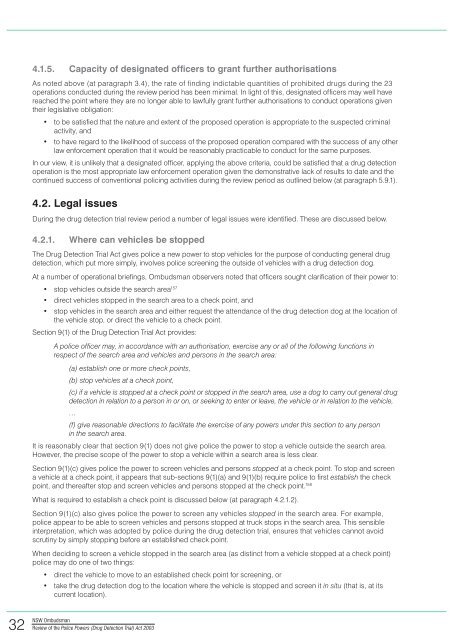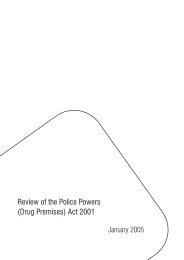Review of the Police Powers (Drug Detection Trial) Act 2003 - NSW ...
Review of the Police Powers (Drug Detection Trial) Act 2003 - NSW ...
Review of the Police Powers (Drug Detection Trial) Act 2003 - NSW ...
Create successful ePaper yourself
Turn your PDF publications into a flip-book with our unique Google optimized e-Paper software.
4.1.5. Capacity <strong>of</strong> designated <strong>of</strong>ficers to grant fur<strong>the</strong>r authorisations<br />
As noted above (at paragraph 3.4), <strong>the</strong> rate <strong>of</strong> finding indictable quantities <strong>of</strong> prohibited drugs during <strong>the</strong> 23<br />
operations conducted during <strong>the</strong> review period has been minimal. In light <strong>of</strong> this, designated <strong>of</strong>ficers may well have<br />
reached <strong>the</strong> point where <strong>the</strong>y are no longer able to lawfully grant fur<strong>the</strong>r authorisations to conduct operations given<br />
<strong>the</strong>ir legislative obligation:<br />
• to be satisfied that <strong>the</strong> nature and extent <strong>of</strong> <strong>the</strong> proposed operation is appropriate to <strong>the</strong> suspected criminal<br />
activity, and<br />
• to have regard to <strong>the</strong> likelihood <strong>of</strong> success <strong>of</strong> <strong>the</strong> proposed operation compared with <strong>the</strong> success <strong>of</strong> any o<strong>the</strong>r<br />
law enforcement operation that it would be reasonably practicable to conduct for <strong>the</strong> same purposes.<br />
In our view, it is unlikely that a designated <strong>of</strong>ficer, applying <strong>the</strong> above criteria, could be satisfied that a drug detection<br />
operation is <strong>the</strong> most appropriate law enforcement operation given <strong>the</strong> demonstrative lack <strong>of</strong> results to date and <strong>the</strong><br />
continued success <strong>of</strong> conventional policing activities during <strong>the</strong> review period as outlined below (at paragraph 5.9.1).<br />
4.2. Legal issues<br />
During <strong>the</strong> drug detection trial review period a number <strong>of</strong> legal issues were identified. These are discussed below.<br />
4.2.1. Where can vehicles be stopped<br />
The <strong>Drug</strong> <strong>Detection</strong> <strong>Trial</strong> <strong>Act</strong> gives police a new power to stop vehicles for <strong>the</strong> purpose <strong>of</strong> conducting general drug<br />
detection, which put more simply, involves police screening <strong>the</strong> outside <strong>of</strong> vehicles with a drug detection dog.<br />
At a number <strong>of</strong> operational briefings, Ombudsman observers noted that <strong>of</strong>ficers sought clarification <strong>of</strong> <strong>the</strong>ir power to:<br />
• stop vehicles outside <strong>the</strong> search area 157<br />
• direct vehicles stopped in <strong>the</strong> search area to a check point, and<br />
• stop vehicles in <strong>the</strong> search area and ei<strong>the</strong>r request <strong>the</strong> attendance <strong>of</strong> <strong>the</strong> drug detection dog at <strong>the</strong> location <strong>of</strong><br />
<strong>the</strong> vehicle stop, or direct <strong>the</strong> vehicle to a check point.<br />
Section 9(1) <strong>of</strong> <strong>the</strong> <strong>Drug</strong> <strong>Detection</strong> <strong>Trial</strong> <strong>Act</strong> provides:<br />
A police <strong>of</strong>ficer may, in accordance with an authorisation, exercise any or all <strong>of</strong> <strong>the</strong> following functions in<br />
respect <strong>of</strong> <strong>the</strong> search area and vehicles and persons in <strong>the</strong> search area:<br />
(a) establish one or more check points,<br />
(b) stop vehicles at a check point,<br />
(c) if a vehicle is stopped at a check point or stopped in <strong>the</strong> search area, use a dog to carry out general drug<br />
detection in relation to a person in or on, or seeking to enter or leave, <strong>the</strong> vehicle or in relation to <strong>the</strong> vehicle,<br />
…<br />
(f) give reasonable directions to facilitate <strong>the</strong> exercise <strong>of</strong> any powers under this section to any person<br />
in <strong>the</strong> search area.<br />
It is reasonably clear that section 9(1) does not give police <strong>the</strong> power to stop a vehicle outside <strong>the</strong> search area.<br />
However, <strong>the</strong> precise scope <strong>of</strong> <strong>the</strong> power to stop a vehicle within a search area is less clear.<br />
Section 9(1)(c) gives police <strong>the</strong> power to screen vehicles and persons stopped at a check point. To stop and screen<br />
a vehicle at a check point, it appears that sub-sections 9(1)(a) and 9(1)(b) require police to first establish <strong>the</strong> check<br />
point, and <strong>the</strong>reafter stop and screen vehicles and persons stopped at <strong>the</strong> check point. 158<br />
What is required to establish a check point is discussed below (at paragraph 4.2.1.2).<br />
Section 9(1)(c) also gives police <strong>the</strong> power to screen any vehicles stopped in <strong>the</strong> search area. For example,<br />
police appear to be able to screen vehicles and persons stopped at truck stops in <strong>the</strong> search area. This sensible<br />
interpretation, which was adopted by police during <strong>the</strong> drug detection trial, ensures that vehicles cannot avoid<br />
scrutiny by simply stopping before an established check point.<br />
When deciding to screen a vehicle stopped in <strong>the</strong> search area (as distinct from a vehicle stopped at a check point)<br />
police may do one <strong>of</strong> two things:<br />
• direct <strong>the</strong> vehicle to move to an established check point for screening, or<br />
• take <strong>the</strong> drug detection dog to <strong>the</strong> location where <strong>the</strong> vehicle is stopped and screen it in situ (that is, at its<br />
current location).<br />
32<br />
<strong>NSW</strong> Ombudsman<br />
<strong>Review</strong> <strong>of</strong> <strong>the</strong> <strong>Police</strong> <strong>Powers</strong> (<strong>Drug</strong> <strong>Detection</strong> <strong>Trial</strong>) <strong>Act</strong> <strong>2003</strong>

















